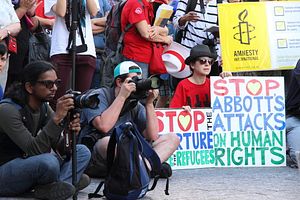A tropical paradise or a place where foreigners risk serious danger and hardships? When it comes to refugees, the Australian government has been acting like a used car salesman trying to peddle a sale – or in this case, a one-way ticket to Cambodia. Australia has been pulling out all the stops to convince refugees from Nauru to take a charter flight to Cambodia, which could leave as early as this week.
A letter that Australian officials recently sent to refugees on the island of Nauru, obtained by the Guardian, claims that, “Cambodia is a safe country, where police maintain law and order. It does not have problems with violent crime or stray dogs. Cambodians enjoy all the freedoms of a democratic society including freedom of religion and freedom of speech.”
But that’s not what the Department of Foreign Affairs and Trade is telling Australians. Its travel advice for its own citizens has this to say: “Opportunistic crime is common in Cambodia… Assaults and armed robberies against foreigners have occurred, and foreigners have been seriously injured and killed… Banditry and extortion, including by military and police personnel, continue in some rural areas… Australians should avoid all political gatherings, protests and demonstrations as they may turn violent. Local police and security forces have responded with force on occasion.”
For its part, Khmer-language media in Cambodia are reporting an upsurge in violent crime, aimed particularly at foreigners, which it says the government is unable or unwilling to address.
Why is the Australian government telling its own citizens the truth, while telling refugees a pack of lies? Simple. The government has sent more than 800 asylum seekers who tried to reach Australia by boat to Nauru for resettlement and refugee processing. It’s now trying to get some of those found to be refugees to go to Cambodia. It is desperate to implement its A$40 million ($31.1 million) deal with Cambodia to send refugees there so it can show that it has not trapped them forever on Nauru.
To its credit, Cambodia has insisted that only refugees who consent to go to Cambodia will be accepted, and up until now, no one has been willing to go. So now Canberra is resorting to deception to persuade some of them to take up the offer.
The reality is that Cambodia is an extremely poor country with no safety net. There are few social services for Cambodian citizens, let alone foreigners. The Australian government letter touts Cambodia’s healthcare system as being “of a good quality for the region,” but it’s not even equipped to meet the needs of most Cambodians, much less refugees. Mental health treatment is virtually non-existent, though Cambodia is full of people suffering the psychological effects of the Khmer Rouge period and subsequent wars and mass atrocities.
As for protecting freedom of speech, that wasn’t the experience of 10 women whose trial I observed there last November. After a three-hour show trial, the women were fined and each sentenced to a year in prison. Their crime? “Obstructing traffic” while protesting the flooding of their homes. Opposition activists and politicians are regularly arrested. The notoriously corrupt police commit abuses with impunity, while the courts run on exchanges of money.
The Australian government letter describes “jobs for migrants, and strong support networks for newly settled refugees, including opportunities to buy businesses.” But the refugees I met in November who had gone to Cambodia seeking asylum told a different story – of discrimination that makes jobs hard to get, of language barriers, and low wages that don’t even cover subsistence costs. They told me how difficult their lives were, and how they live hand to mouth.
“This is a corrupt country,” one refugee told me, when asked what advice he would give to the people on Nauru. “You will not find jobs. We have been here more than two years and we have no money and not enough to eat. It’s better to wait in Nauru. It is a very, very bad life here in Cambodia. There is no future.”
So who will look after refugees traumatized by the persecution in their home countries, perilous boat journeys, long periods in detention, and the shock of being dropped into a completely unknown culture without being able to speak the local language?
Refugees on Nauru already have a difficult life with squalid conditions and abuses in detention, and limited job prospects and a lack of safety for those released into the community. But they are understandably fearful of making a new life for themselves in Cambodia where respect for human rights depends on who you are, where you come from, and who you know. Needless to say, foreigners fleeing war and repression are likely to start at the bottom of that pecking order.
Australia should end its sick joke of pretending Cambodia is a safe country for refugees. It’s unconscionable to lie to people who have already suffered so much and to put them in further danger. The right thing to do would be to close the camps on Nauru and Manus Island once and for all, and allow those found to be refugees the chance to start their lives over in Australia, a paradise or not.
Elaine Pearson is Australia director at Human Rights Watch

































